CHARLES DARWIN (1809-1882)
February 12th 2009 saw the bicentenary of Darwin’s birth. Along with Isaac Newton he was one of the greatest British scientists, though his science is still controversial. To some he was a great scientist and to others the devil incarnate!
He was a quiet family man, whose life was marred by illness. He was born into an affluent home in Shrewsbury
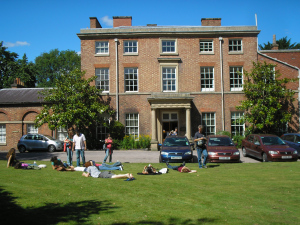
and went to Cambridge to study for the Anglican ministry.
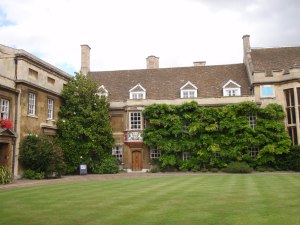
In 1831 he was invited to join the Beagle to sail round the world. That changed his life and the course of science. On that voyage he was more interested in geology and only later “moved” over to biology.
Darwin learned his science at both Edinburgh and Cambridge and some of his student notes survive. His family was scientific and as a teenager he had a well-equipped chemistry lab in an outhouse at the Mount, the family home. At Cambridge he joined the Rev John Henslow’s unofficial natural history classes and fieldtrips and was introduced to the geologist, the Rev Adam Sedgwick.
In August 1831 he joined Sedgwick on a geological trip to North Wales, which gave Darwin the finest teaching a budding geologist could hope for and the grounding for the Beagle voyage. A study of his notes and routes demonstrates how he developed as a geologist. Studying that gave me great pleasure. Here is his/my favourite place -Cwm Idwal
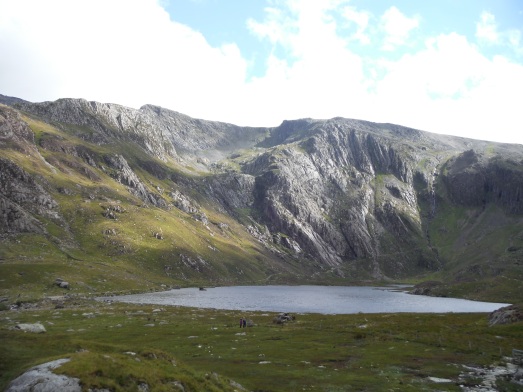
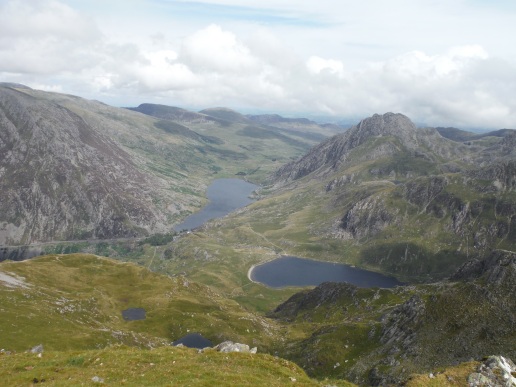
His priority on the Beagle voyage was geology, and he also collected many biological specimens. On return Darwin wrote up his geology in three volumes and got other naturalists to deal with biology.
After marriage to Emma Wedgwood in 1839, he moved to Downe in 1842 by which time illness had struck. For many years he carried out detailed work on barnacles, while developing with his species theory. He had written two drafts in 1842 and 1844. (His 1842 draft was punctuated by a visit to North wales to see if there was glaciation. see my paper. By then, even though only 33, he was not physically capable of climbing mountains.) These are Darwin’s Boulders in Cwm Idwal


In the late 1850s he was working on a big book on evolution, but was jolted into action by the arrival of a letter from Wallace in 1858 in which Wallace independently proposed the theory of natural selection. As a result, he wrote a shorter book The Origin of Species, which was published in 1859. Over the next twenty years he wrote a series of biological books on orchids, insectivorous plants, climbing plants, cross- and self-fertilisation in plants, and, finally, on worms. The book, which gave the greatest challenge to some theological views was The Descent of Man (1871), which posited a totally evolutionary view of humans. His published works fill 29 volumes and represented the cutting edge of biology in his day.
The great achievement of Darwin was to show how all life is inter-related and tied into the physical structure of this planet. By showing the evolution of humans he demonstrated that we are part of the natural world and not separate from it. Though aspects of his work have been superseded, his basic theory still holds today. To put it simply, Darwin took over earlier ideas of geology and the succession of life from trilobites and invertebrates, through dinosaurs and other vertebrates and finally to humans. Drawing from many aspects of biology he argued that life forms change over time and that ultimately all living things have a common ancestor. This now forms the basis of all biology and TV programmes on wildlife like those of David Attenborough.
Faith
When Darwin set sail on the Beagle he had intended to become an Anglican clergyman, but that faded during the voyage. The Darwin-Wedgwood family came from radical dissenting stock, though Charles was baptised in St Chad’s Church Shrewsbury, and with his parents and siblings worshipped at the Unitarian Church. How far his faith was simply nominal we cannot say, but before the Beagle he showed some signs of devotion and his notes on the evangelical John Sumner’s Evidence of Christianity show some serious theological thinking. However, by 1839 all that had gone and he was open to his future wife, Emma, about his lack of belief. He wavered between a vague theism and atheism and ‘must be content to remain an agnostic’. I consider Moore and Desmond’s argument that he lost his faith after the death of his ten-year-old daughter, Annie, overstated and not based on hard evidence. At Downe he was a flying-buttress member of the church. His Autobiography written a year or so before he died contains a fascinating section on his beliefs.
Morality
Some portray Darwin as destroying all morality because of our evolutionary ancestry. Darwin was a highly moral person, both in his personal life and concern for others. He supported many good causes, including SAMS (South American Missionary Society). He is often charged with being a racist, and perhaps he was according to 21st century PC standards. However he was the third generation Darwin/Wedgwood to oppose slavery. He was appalled at slavery in Brazil and in the 1860s objected to the slavery in the Southern states of the USA. This comes out very strongly in his letters with Asa Gray , the Harvard botanist and populariser of The Origin in the USA. Same anti-evolutionists claim that Darwin’s views lead straight to Mein Kampf and the Holocaust, as if Darwin was responsible for the twisted ideas of Hitler. A close study does not support that, and we need to note that creationist anti-evolution has often resulted in racism as in the Southern States and Apartheid South Africa.
The effect of Darwin on Christian Belief

Darwin is often credited with making Christian belief intellectually untenable. He never considered that to be the case and the greatest challenge to biblical orthodoxy came from biblical criticism and a new theology. Compared to Essays and Reviews (1861) the Origin of Species had little theological impact. It is often not known that decades before 1859 most educated Christians had rejected a literal Genesis (if they had ever held it, which I doubt), a young Earth, a worldwide flood and a theodicy dependent on physical death coming in at the fall of Man. In a recent BBC Wildlife magazine, Attenborough repeated this incorrect opinion that “This[the date of 4004BC for creation] was based on the calculations of archbishop Ussher”.
Where Darwin has impacted negatively on belief this has been far more later generations reading back to Darwin rather than what Darwin said. This negativity is epitomised by Samuel Wilberforce and his “debate” with Huxley, which came to the fore in the 1890s when T H Huxley and others wrote their memoirs and claimed there had been a battle royal in the 1860s, which gave rise to the conflict thesis of science and religion which has been rejected by recent historians of science. However it is repeated by many today, e.g. Richard Dawkins, Steve Jones and much pop history of science. It is still adopted by several church historians and theologians, despite constant criticism.
Christian opposition to Darwin and evolution
The popular perception is that the Christians have always been implacably opposed to Darwin, despite the vast volume of scholarship contradicting this. However, ever since 1859 some Christians have opposed Darwin. Initially some, who accepted geology, rejected evolution for various reasons, but none from a Young Earth position, which claims that the earth is no more than 10,000 years old.
During the last thirty years in Britain, Young Earth Creationism (YEC) has come to prominence. YEC is not the traditional Christian view, as it originated with the Seventh Day Adventists in the late 19th century from Ellen White and George McCready Price. It remained a minority view among American evangelicals until YEC was kick-started again in 1961 with the publication of The Genesis Flood. YEC now dominates American evangelicalism and is growing rapidly in Britain.

A more recent anti-evolution movement is Intelligent Design, which is now closely associated with YEC. Neither YEC nor ID has any credence as science.
Anglicans and Darwin/evolution
Contrary to some opinion the Anglican Church has been very postive towards all science for 500 years. While Galileo was under house arrest, the Revd John Wilkins published a Copernican book. Many of the early fellows of the Royal Society were Anglican clergy; I shall only mention John Ray, who suspected that the earth was older than Ussher allowed! From 1780 many Anglicans supported the rising science of geology and some of the most significant world geologists before Darwin were Anglican clergy like Adam Sedgwick, William Buckland and William Conybeare. In the period 1800 to 1855, over 80% of Anglican clergy accepted geology (an approximate figure from my reading as many writers as possible). (MBR Genesis Chapter One and Geological Time from Hugo Grotius and Marin Mersenne to William Conybeare and Thomas Chalmers (1620 to 1825),p39-50 Myth and Geology; ed Piccardi and Masse (Special Publication 273 of the Geological Society of London) (March 2007).
Open this;
A small and vociferous minority did oppose geology; for example the Revd Henry Cole calling the evangelical Sedgwick an ‘infidel scoffer’. (MBR Adam Sedgwick (1785_1873): geologist and evangelical; p155-170 Religion and Geology. Ed Kolbl-Ebert, Geological Society, London, Special Publications 2009; v. 310;)
Open this;
However, these devout anti-geologists were savaged by clerical-geologists like Sedgwick and disappeared by 1855 only to re-appear, Phoenix-like, in the 1980s, including at least one bishop.
The reaction to Darwin was varied. Some happily accepted evolution: Frederick Temple, R. W. Church, Hort (but Westcott was wary), Baden Powell, Liddon, Pusey (just!), Symonds and two evangelicals – H. B. Tristram of Durham and Prof C Babbington of Cambridge. Within decades most thinking Anglicans had accepted evolution but often insisted on the direct creation of humans. Some Anglicans opposed evolution, archetypically Samuel Wilberforce, but all opponents accepted geological time. Some of the main opposition to Darwin came from physicists and geologists.
This rapprochement between Christianity and evolution continued until 1980, with most, including the majority of evangelicals, accepting evolution, with a minority rejecting evolution but not geology. In fact, I can only find one YEC Anglican from 1855 until the 1970s. That was W. H. Griffith Thomas, who accepted evolution while principal of Wycliffe Hall, Oxford. He went to North America in 1910 and by 1917 came to accept a Young Earth through the influence of the Seventh Day Adventist autodidact McCready Price. I cannot find of another Anglican example, and teachers from Moule to Packer and Stott all accepted evolution. (Bishop J. C. Ryle accepted geological time albeit not evolution, and represents the ultra-conservative Anglican of 1900.)
Things began to change after the publication in Britain of The Genesis Flood by Morris and Whitcomb in 1968. Since then increasing numbers of British evangelicals have rejected evolution and espoused the biblical literalism of YEC. My informed impression is that possibly 5% of Church of England clergy are YEC. At least two, Kevin Logan and Martin Dowe, have written paperbacks of doubtful value promulgating YEC. There are more who are sympathetic to Intelligent Design, which is marginally more scientific than YEC.
Against that, the majority of Christians, whether or not Anglicans simply don’t care about doubts about evolution and take it for granted! For the last 130 years most Anglican theological writers have happily accepted evolution, whether they were conservative or liberal. Some have focussed on science and religion and from a previous generation include Mascall, Yarnold, Raven and Smethurst. The late Arthur Peacocke and John Polkinghorne have dominated the scene since 1980, with Alister McGrath of increasing significance. Very few concentrate on Darwin and evolution, apart from R. J. Berry, a geneticist.
To some, Darwin’s theory of evolution nullifies the Christian faith and both Richard Dawkins and Creationist Christians share that opinion. These opinions and those of the majority, agnostic or Christian, who reckon that Darwin does not affect the Christian faith will be heard loudly and widely this year.
Conclusion
Understandably some don’t like the thought that they are descended from apes and ultimately from an amoeba. At first sight this makes us less than human and that our morals have no basis. Atheists like Richard Dawkins in The God Delusion claiming that you have to choose between God and evolution, or even science, do not help this. Compared to that strident claim, those who take the bible literally with a six day creation as in Genesis seem plausible – until you examine their arguments and find that their science is simply appalling, as well as their biblical interpretation.
In one sense I can see why some Christians are disturbed by Darwin or evolution, but the whole picture of a five billion year old Earth which first produced life four billion years ago and then ultimately all the intricate variety of life we know today is breathtaking and should fill us with awe and wonder – of the Creator. As the Revd. H. B. Tristam, a Victorian evangelical and naturalist, always said, “as we were evolved, sorry, created”.
Now where do I stand? I became a Christian through a Christian Union a few weeks before I graduated in geology. For several years I was unaware there was a clash between science and faith! The conflict between science and faith came as a surprise to me, partly for family reasons as my physicist uncle was ordained and my biochemist father non-religious. I happily keep my faith and science together. To me, all science enhances my faith. I have a particular interest in Darwin, as I have researched his geology in depth. The more I study the man, the more I respect him, but I get irritated with either gross adulation or denigration of a great scientist. He was not a Christian, but was a very moral person. His science was brilliant in its day and laid the foundation for the future. I enjoyed celebrating Darwin’s bicentenary. That year I was lucky to attend conferences in England, Wales, Germany, Egypt and the USA. While in the USA I managed to climb Mt St Helens
To conclude – the memorial plaque to Sedgwick in Dent church

(2009
References; The literature is vast and of uneven quality.
Janet Browne has probably written the best biography.
More popular is
Van Wyhe, John, 2008, Darwin, the story of the man and his theories of evolution. London Andre Deutsch.
My papers on Darwin’s geology;
Darwin at Llanymynech; British Journal for the History of Science, 1996, Vol 29, pp469-78
Darwin’s Dog-leg ; Archives of the History of Natural History, 1998, Vol 25, p59-73
I coloured a map ; Archives of the History of Natural History, 2000, Vol 27,p69-79
Charles Darwin’s 1831 notes of Shropshire,Archives of the History of Natural History 2002,Vol 29 , p 27-9; with Prof.S.Herbert )
Darwin’s Welsh Geology, 1831, Endeavour Spring 2001, 25, p33-37
Darwin, Buckland and the Welsh Ice Age, 1837 – 1842, Proceedings of the Geologists’ Association 123 (2012) 649–662
General topics
Alexander, Denis, 2008 Creation or Evolution. Monarch
Young, Davis & Stearley, 2008 The Bible, Rocks and Time. IVP
Miller, Ken, 1999. Finding Darwin’s God. Harper/Collins
Roberts, M., 2008 Evangelicals and science. Greenwood Press.
Useful websites
http://darwin-online.org.uk/2009.html
http://www.asa3. org
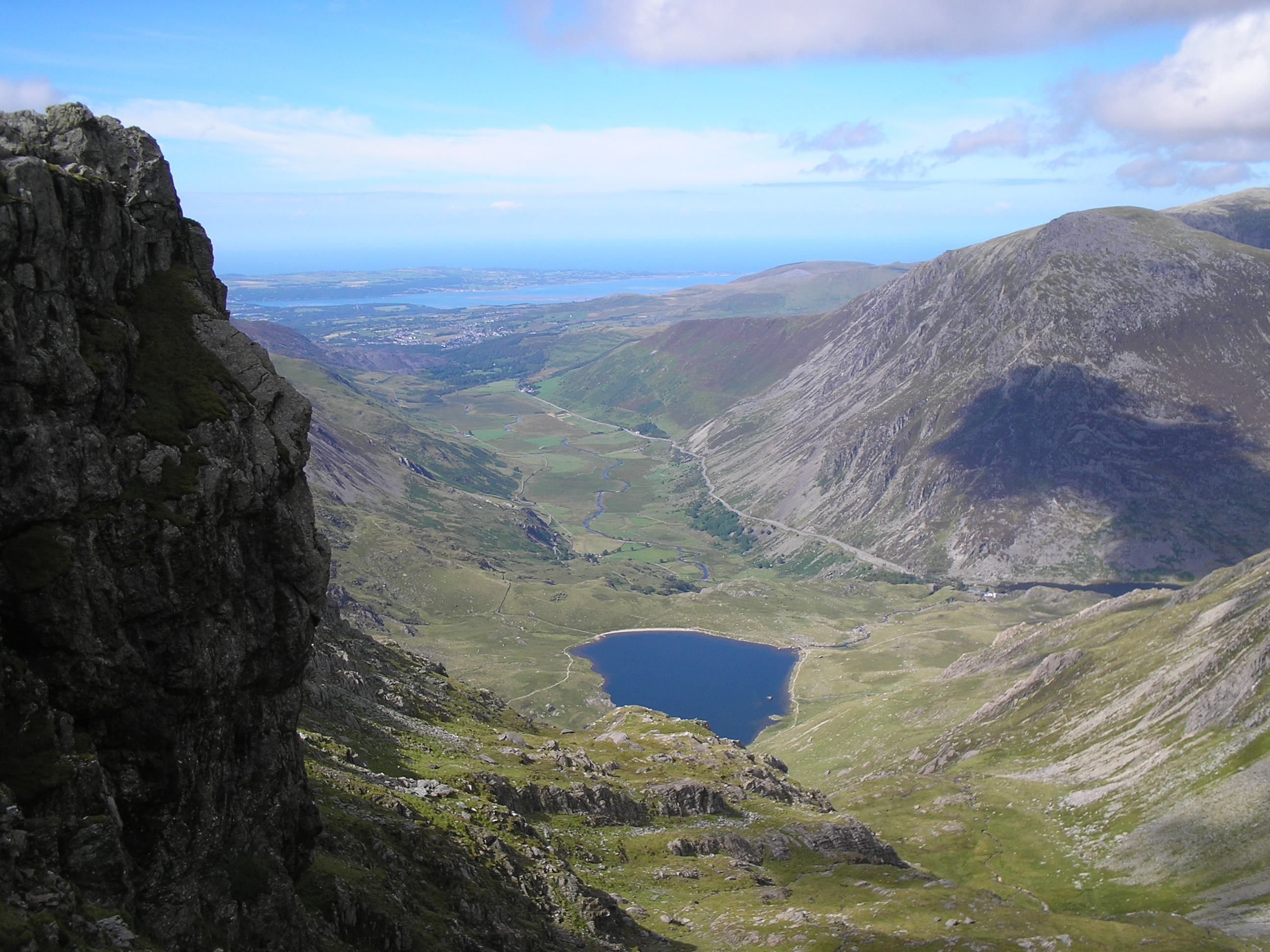



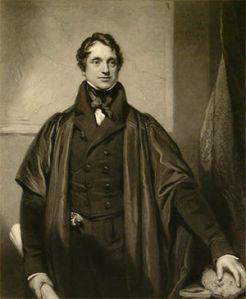








Reblogged this on Eat Your Brains Out; Exploring Science, Exposing Creationism and commented:
The spectacles are not mine, but those of my good friend Michael Roberts. For what it’s worth I think he underestimates Darwin’s attachment to religion. In his Autobiography (not intended for publication) Darwin says that when he was writing On the Origin of Species, he considered it impossible to conceive of this woderful Universe as the product of mere chance, writing “I feel compelled to look to a First Cause having an intelligent mind to some degree analogous to that of man, and I deserve to be called a Theist.” And he attributed his later agnosticism to doubt as to whether a mind evolved through natural selection was capable of grasping such lofty matters
LikeLike
Paul,
I don’t think you and Michael are in disagreement. There’s a sizable difference in my mind between someone who identifies as Christian and someone who keeps atheism/agnosticism at a safe distance because they see some opening (or have some faint longing) for a First Cause/Prime Mover. I think, while Darwin vacillated quite intensely throughout his life (as does any thinking person), he is better understood through the lens of the latter rather than as a Christian.
Michael says above:
“He was not a Christian, but was a very moral person.”
Again, it’s difficult to defend a Christian Darwin, but it’s easier to defend him as someone who respected belief in a First Cause.
LikeLike
Great post. Yes Darwin was a man of good character and anti-evolutionist claims of evolution=racism are shameful. At the same time, they also say evolution make man less, just an animal.
LikeLike
Michael – like many Christians in Science you seem naïve when considering the nature of Lyell and Darwin’s faith and writing, and their acquaintance, and there is wilful ignorance of the Church Father’s views on creation. In the early Church there was a widely accepted commitment to a young earth. I have pointed these things out to Dennis Alexander previously, but it hasn’t registered with the theistic evolutionary revisionist narrative. The YEC position is the traditional position. Consider Augustine. “They are deceived, too, by those highly mendacious documents, which profess to give the history of many thousand years, though, reckoning by the sacred writings, we find that not 6000 years have yet passed.” (The City of God, XII:10). I have previously written about this in my book Cracking the Darwin Code (available on Amazon) and here.
http://creation.com/lessons-from-augustine
http://creation.com/creation-millennium-church-fathers
Lyell appeared to be a sceptic of progressive evolution prior to Darwin’s publication of Origins, but we see that Lyell befriended Darwin after his Beagle voyage and secretly encouraged him to start his notebooks. Keynes points out Darwin’s comment; ‘Lyell entered in the most good natured manner, and almost without being asked, into my plans.’ (Keynes, R., (2002) Fossils, Finches and Fuegians: Charles Darwin’s Adventures and Discoveries on the Beagle 1832-1836, London; Harper Collins. 379).
What was Lyell up to? Lyell was also working to undermine the Anglican clergy in a secretive way, particularly through the Geological Society of London, as Grinnell notes. It was stuffed full of lawyers, doctors and politicians. Grinnell suggest this interest may have been for the purpose of undermining the political establishment with its Monarchical theory of government. (Grinnell, G., (1976) ‘A Probe Into The Origin of the 1832 Gestalt Shift in Geology,’ Kronos: A Journal of Interdisciplinary Synthesis Glassboro, N. J: Kronos Press, Vol. 1(4), Winter 1976, pp. 68-76).
Lyell was working to ‘free the sciences from Moses,’ this through a secretive 20-30 year strategy. This idea comes from a methodology outlined by Voltaire of a slow and silent attack against Christianity, which Lyell draws attention to – he perceived the effective way that Christianity was undermined prior to revolution in France. Lyell wrote the following (14 June 1830). “I am sure you may get into Q.R. [Quarterly Review] what will free the science from Moses…If you don’t triumph over them, but compliment the liberality and candour of the present age, the bishops and enlightened saints will join us in despising both the ancient and modern physico-theologians. It is just the time to strike, so rejoice that, sinner as you are, the Q.R. is open to you. If I have said more than some will like, yet I give you my word that full half of my history and comments was cut out, and even many facts…it was anticipating twenty or thirty years of the march of honest feeling to declare it undisguisedly. I conceived the idea five or six years ago that if ever the mosaic geology could be set down without giving offense, it would be in an historic sketch (Lyell, K, Life, Letters and Journals of Sir. Charles Lyell, London: John Murray, 1881, pp. 268-271).
When you look at Darwin’s letters, you will we see that he was sympathetic to, and followed, Lyell’s long-term strategy. As Darwin admits, this was based upon Voltaire’s maxim; that the best attack against Christianity was the slow and silent attack. “Lyell is most firmly convinced that he has shaken the faith in the Deluge far more efficiently by never having said a word against the Bible, than if had acted otherwise…I have lately read Morley’s Life of Voltaire and he insists strongly that direct attacks on Christianity…produce little permanent effect: real good seems only to follow the slow and silent attacks” (Letter from Charles Darwin to George Darwin, his son, in 1873. In Himmelfarb, G., Darwin and the Darwinian Revolution, Chatto and Windus, 1958, p. 320) “…yet it appears to me…that direct arguments against Christianity and theism produce hardly any effects on the public, and freedom of thought is best provided by the gradual illumination of men’s minds, which follow from the advance of science. (Letter from Charles Darwin to Edward Aveling, Karl Marx’s son in law around 1880. In Herbert, S., ‘The Place of Man in the Development of Darwin’s Theory of Transmutation: Part II,’ Journal of the History of Biology, Vol. 10, no. 2, 1977, p. 161, In: Bowden, The Rise of the Evolutionary Fraud, p. 98).
Lyell and Darwin were working to undermine Christianity, and one influence was Unitarian deism. There was a cause against the Anglican establishment with its commitment to the Mosaic basis of law, and this mirrored the strategy of the French Revolution.
LikeLike
Andrew, Your historical understanding is weird and warped as I have pointed out on many occasions. There is no point persuing your line which does not accord with historical documents or that of historians of science
LikeLike
Reblogged this on Fairminded Notions.
LikeLiked by 1 person
Pingback: REVIEW: What the Fossils Say and Why It Matters – Waiving Entropy